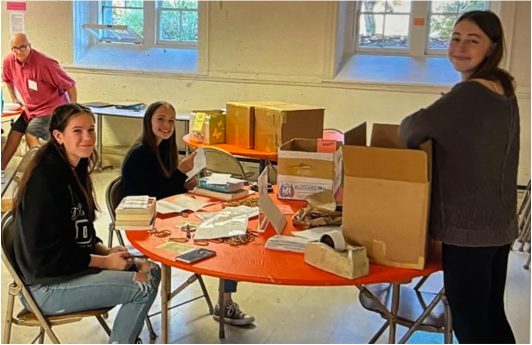By Madison Butkus
Hometown Weekly Reporter
Sponsored by the Watertown Free Public Library (WFPL), the Needham Free Public Library (NFPL) shared an online event titled “Access to Books in the Context of Mass Incarceration.” This was a part of the WFPL’s Democracy Talks series where they dive in and look at issues where everyone can try to help our democracy and our rights.
Leading this specific discussion was Kelly Brotzman who is currently the Executive Director of the Prison Book Program (PBP) located in Quincy, MA. The PBP is a 50-year-old nonprofit organization devoted to sending free, high-quality books and other reading materials to people in prisons and jails across the country.
The NFPL’s website went on to state, “Under Kelly's leadership, PBP has grown tremendously, holding nearly 200 volunteer sessions per year and expanding to serve incarcerated readers in all 50 states. Her passion for supporting people in prison comes from her experiences teaching college classes in prisons and volunteering as an academic mentor to incarcerated college students.”
Throughout this presentation, Brotzman discussed mass incarceration within the U.S., what the role of education is within reducing recidivism, the critical role books play for people in prison, and PBP’s role in getting those reading materials to the folks behind bars. To start off, Brotzman explained what exactly mass incarceration is, and showed a graphic depicting that, as of last year, 1.9 million people are confined nationwide. She explained that according to the Prison Policy Initiative, “The U.S. locks up more people per capita than any other nation, at the staggering rate of 565 per 100,000 residents,” and Massachusetts is surely no exception to this.
Brotzman further explained how recidivism is a major problem within the prison system, in which 43% of released prisoners are rearrested within the first year following their release. A solution to this problem: education within the prison system. This is the single most effective intervention to prevent recidivism, but many jails/prisons are not obligated to provide it. For many institutions, jails provide no education, federal and state prisons provide some including ABE and GED, but most inmates rely on self-directed education.
This type of education is obtained mainly through books which can be offered by the libraries on site, friends and family members, and/or retailers. Even with these options, there are many limitations that come with them and therefore access to books can be extremely difficult within the prison system. Brotzman discussed some common book restrictions seen within prisons: no hardback books, no used books (brand new books only), no blank composition books, no dictionaries, no coloring books, no books with maps in them, no trade skill books, and more. The reasons for these restrictions, in Broztman’s opinion, do not always reflect why an inmate is asking for these types of books. For example, inmates cannot ask for computer or coding skills books due to most prison alarm system’s now being computerized. It is believed that inmates want to try to learn how to override the system, when in fact, they are most likely trying to learn about these types of things in order to get a job upon getting out.
With these types of restrictions in mind, the PBP still serves over 1,000 prisons and jails in all 50 states, Guam, and Puerto Rico. This organization is all volunteer based in which inmates will reach out to them asking for what books they would like. In 2023, they sent out 18,172 packages containing over 63,000 books. Many of the inmates send gracious thank you notes in return, some of which telling the PBP they are doing “god’s work.” The books they send out mainly come from walk-in donations and they are always looking for gently used paperbacks in the following categories: genre fiction, foreign language dictionaries/study books, Art how-to, LGBTQ+ fiction and nonfiction, trade skills, Manga, graphic novels, comics, non-mainstream religions, crafts and hobbies, and health and wellness.
Brotzman expressed that there are many ways to help the PBP, like volunteering and donating both books and money, but perhaps the biggest way to help is through advocating. For more information on this amazing program, please visit their website at www.prisonbookprogram.org.






















